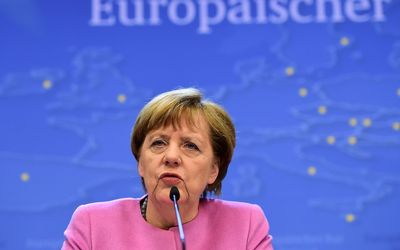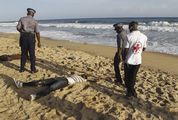Voter turnout high in election test of Merkel’s migrants policy
by Paul Carrel and Joseph Nasr ,
2016-03-13 17:29:17.0
BERLIN/WITTENBERG — Germans turned out in force to vote in three state elections on Sunday, with the anti-immigration Alternative for Germany (AfD) party looking to profit from popular angst about Chancellor Angela Merkel’s welcome of more than 1-million migrants.
The election is the biggest test this year of the German public response to the influx, totalling more than a million last year alone and showing no sign of halting, of refugees and other migrants from the Middle East, Central Asia and Africa.
Ms Merkel, who says Germany is a rich enough country to host desperate people and has a moral obligation to shelter those in danger, has staked her reputation on her management of the unprecedented influx, which has come to define her leadership.
Her conservative Christian Democrats (CDU) have been losing support to the AfD, which has profited from the growing unease.
A poor CDU performance would weaken Merkel just as she tries to push through a deal to resolve the crisis in EU negotiations with Turkey, the country from which most migrants depart by sea to reach the European Union (EU) through Greece.
The AfD argues that Germans have been denied a choice over a policy that could define their country for generations, with Ms Merkel ruling in a "grand coalition" that includes her party’s Socialist rivals.
"There is only one path, a Merkel unity path, and people want an alternative, they want a real opposition and we want to take on that task," Andre Poggenburg, AfD leader in Saxony-Anhalt in former East Germany, said after voting.
Voter turnout there and in the two other states holding elections, which with a combined population of about 17-million account for more than a fifth of Germany’s 81-million, was well up from the last regional votes five years ago.
By midday, turnout was at 25% in Saxony-Anhalt, about 5% higher than 2011, election officials said. In Rhineland-Palatinate, turnout — including postal votes — was at about 40%, up 9% from 2011. Local media in Baden-Wuerttemberg also reported higher voter numbers.
The results of exit polls for all three states are expected at around 6pm.
A failure to win at least two of the three would be a blow for Ms Merkel just as she is trying to use her status as Europe’s most powerful leader to seal an EU deal with Turkey to stem the arrival of migrants.
Polls indicate that the CDU will remain the biggest party in Saxony-Anhalt, but the AfD could grab almost a fifth of the vote there and surpass the Social Democrats (SPD), Ms Merkel’s coalition partners in Berlin.
"It is a hopeless situation because there is a lot of hopelessness here," said Erika Schmidt, voting in Wittenberg in Saxony-Anhalt. "But the AfD has no plan. That’s why I didn’t vote for them."
Still, Ms Schmidt was unimpressed with Ms Merkel. Asked if she believed in the chancellor’s mantra of "We can do this" during the refugee crisis, she replied: "No, we can’t do this."
In the west, the CDU could lose to the Greens in Baden-Wuerttemberg, where it is the largest party. And in Rhineland-Palatinate, where the CDU came a close second last time, the race is too close to call.
A poor showing for the CDU would be untimely for Ms Merkel, who still needs to seal the deal with Turkey at a March 17-18 summit. She alarmed many EU leaders last week by foisting the plan on them and demanding their support.
In Baden-Wuerttemberg in southwestern Germany, the CDU’s candidate to reclaim control of the region from the Greens, admitted he felt some jitters as he turned out to vote.
"Of course I feel a healthy nervousness, but I am incredibly confident," Guido Wolf said in the town of Tuttlingen.
Baden-Wuerttemberg was a CDU stronghold for more than 50 years before turning to a Green-led coalition with the SPD in 2011 after Japan’s Fukushima nuclear disaster. Polls show the Greens’ state premier Winfried Kretschmann, 67, is poised to pip Mr Wolf.
Rhineland-Palatinate, a wine-growing region, is shaping up as the pivotal swing state.
There, Julia Kloeckner, a 43-year-old former German "wine queen" who has positioned herself as a candidate to succeed Ms Merkel one day, has seen her lead shrink and one poll last week showed her narrowly behind SPD incumbent Malu Dreyer.
Reuters

Angela Merkel. Picture: AFP PHOTO/EMMANUEL DUNAND
BERLIN/WITTENBERG — Germans turned out in force to vote in three state elections on Sunday, with the anti-immigration Alternative for Germany (AfD) party looking to profit from popular angst about Chancellor Angela Merkel’s welcome of more than 1-million migrants.
The election is the biggest test this year of the German public response to the influx, totalling more than a million last year alone and showing no sign of halting, of refugees and other migrants from the Middle East, Central Asia and Africa.
Ms Merkel, who says Germany is a rich enough country to host desperate people and has a moral obligation to shelter those in danger, has staked her reputation on her management of the unprecedented influx, which has come to define her leadership.
Her conservative Christian Democrats (CDU) have been losing support to the AfD, which has profited from the growing unease.
A poor CDU performance would weaken Merkel just as she tries to push through a deal to resolve the crisis in EU negotiations with Turkey, the country from which most migrants depart by sea to reach the European Union (EU) through Greece.
The AfD argues that Germans have been denied a choice over a policy that could define their country for generations, with Ms Merkel ruling in a "grand coalition" that includes her party’s Socialist rivals.
"There is only one path, a Merkel unity path, and people want an alternative, they want a real opposition and we want to take on that task," Andre Poggenburg, AfD leader in Saxony-Anhalt in former East Germany, said after voting.
Voter turnout there and in the two other states holding elections, which with a combined population of about 17-million account for more than a fifth of Germany’s 81-million, was well up from the last regional votes five years ago.
By midday, turnout was at 25% in Saxony-Anhalt, about 5% higher than 2011, election officials said. In Rhineland-Palatinate, turnout — including postal votes — was at about 40%, up 9% from 2011. Local media in Baden-Wuerttemberg also reported higher voter numbers.
The results of exit polls for all three states are expected at around 6pm.
A failure to win at least two of the three would be a blow for Ms Merkel just as she is trying to use her status as Europe’s most powerful leader to seal an EU deal with Turkey to stem the arrival of migrants.
Polls indicate that the CDU will remain the biggest party in Saxony-Anhalt, but the AfD could grab almost a fifth of the vote there and surpass the Social Democrats (SPD), Ms Merkel’s coalition partners in Berlin.
"It is a hopeless situation because there is a lot of hopelessness here," said Erika Schmidt, voting in Wittenberg in Saxony-Anhalt. "But the AfD has no plan. That’s why I didn’t vote for them."
Still, Ms Schmidt was unimpressed with Ms Merkel. Asked if she believed in the chancellor’s mantra of "We can do this" during the refugee crisis, she replied: "No, we can’t do this."
In the west, the CDU could lose to the Greens in Baden-Wuerttemberg, where it is the largest party. And in Rhineland-Palatinate, where the CDU came a close second last time, the race is too close to call.
A poor showing for the CDU would be untimely for Ms Merkel, who still needs to seal the deal with Turkey at a March 17-18 summit. She alarmed many EU leaders last week by foisting the plan on them and demanding their support.
In Baden-Wuerttemberg in southwestern Germany, the CDU’s candidate to reclaim control of the region from the Greens, admitted he felt some jitters as he turned out to vote.
"Of course I feel a healthy nervousness, but I am incredibly confident," Guido Wolf said in the town of Tuttlingen.
Baden-Wuerttemberg was a CDU stronghold for more than 50 years before turning to a Green-led coalition with the SPD in 2011 after Japan’s Fukushima nuclear disaster. Polls show the Greens’ state premier Winfried Kretschmann, 67, is poised to pip Mr Wolf.
Rhineland-Palatinate, a wine-growing region, is shaping up as the pivotal swing state.
There, Julia Kloeckner, a 43-year-old former German "wine queen" who has positioned herself as a candidate to succeed Ms Merkel one day, has seen her lead shrink and one poll last week showed her narrowly behind SPD incumbent Malu Dreyer.
Reuters




















Change: 1.22%
Change: 1.39%
Change: 1.21%
Change: 1.13%
Change: 2.10%
Data supplied by Profile Data
Change: 0.43%
Change: 1.28%
Change: 1.22%
Change: 0.00%
Change: 1.64%
Data supplied by Profile Data
Change: 0.79%
Change: 0.65%
Change: 0.62%
Change: 0.98%
Change: 0.81%
Data supplied by Profile Data
Change: 0.69%
Change: 0.62%
Change: 1.16%
Change: -0.52%
Change: -1.56%
Data supplied by Profile Data